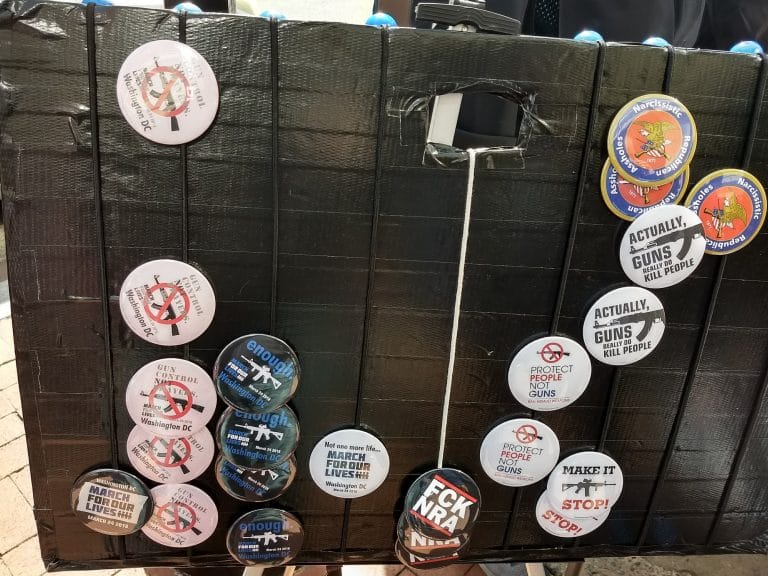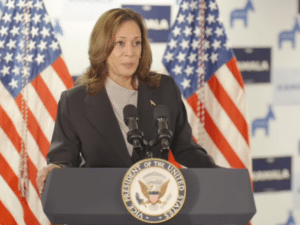One of the biggest strengths of the gun-rights movement has long been the asymmetry in electoral passion over guns among voters. But that could be changing.
Gun-rights supporters have traditionally been highly passionate about gun policy, willing to engage in the political sphere, and often highly mobilized to vote in elections where they perceive gun rights to be at stake. At the same time, gun-control supporters have tended to be less singularly focused on gun control as a political priority.
Even at times when public sentiment has tilted in favor of stricter gun laws, such as in the aftermath of high-profile mass shootings, the gun-rights position has tended to win the day just based on the simple fact that gun control has typically ranked lower on the priority list of voters who support it, behind more kitchen table issues such as the economy, crime, health care, etc.
Even in instances where the gun-control position has achieved victory in the policy sphere, such as in blue state ballot measures, the margins of those victories have almost unanimously been slimmer than general issue polling would have suggested.
Unfortunately for gun-rights advocates, there’s some early evidence that this might be changing.
A new Pew Research poll released Wednesday found that Democrats and Democratic-leaning independents now rate gun violence as the top problem facing the country, with 81 percent saying it is “a very big problem.” That puts it ahead of other typical Democratic staple issues such as health care costs, climate change, racial justice issues, and even more unanimous kitchen table issues like inflation and K-12 education.
While Pew did not release the crosstabs that would allow measurement of Democratic responses over time, the data they did release show that Americans overall have grown increasingly concerned with gun violence over the last seven years. The number of respondents who say gun violence is a “very big problem” has increased 12 percent since 2016 and is up nine percent since just May of last year.
To be sure, a steady uptick in concern over gun violence alone is not dispositive of growing support for gun control. One could presumably be concerned with “gun violence” and not favor tighter restrictions on gun ownership as a solution.
There’s also clearly a partisan dynamic going on in the Pew poll that makes those distinctions hard to separate. For instance, while 81 percent of Democratic-leaning respondents said they were most concerned with “gun violence,” only 38 percent of Republican learners are, that relationship flipped when the term “violent crime” was invoked. On that issue, Republican-leaning respondents were twelve points more likely to say it is a very big problem compared with Democrats.
But that partisan split over terms does suggest, at least at some level, concern over gun violence could be coded with gun restrictions in mind, entirely separate with “law and order” concerns over general criminality.
The age stratification in who is most concerned is also noteworthy. In the Pew poll, older respondents were 15 points more likely than the youngest respondents, those aged 18-29, to rate gun violence as the issue they think is a very big problem. In other words, those most likely to turn out to vote are becoming the most concerned with guns.
That adds to a growing list of troubling signs in public opinion if you’re a supporter of gun rights. It comes on the heels of last month’s Marist poll showing more Americans than anytime in the previous decade now say reducing gun violence is more important than defending gun rights. A Fox News poll conducted this Spring found that “gun control/violence” was one of the most commonly cited issues offered by registered voters as the most pressing facing the country currently—trailing only the economy and inflation—even without the aid of a prewritten list of options. And finally, Gallup’s most recent poll tracking the issue, released in February, found that Americans overall are more dissatisfied than ever with the country’s gun laws, driven primarily by record-low satisfaction among Democrats and Democratic-leaning independents.
If these trends continue to hold and prove to be sufficiently motivating for people to vote on, gun-rights advocates could soon find that they’ve lost their advantage in ginning up voter turnout. And if the sense of dissatisfaction with current gun laws measured in recent polls is anything close to accurate, the political push for gun control by elected officials will likely accelerate.






